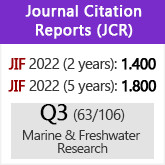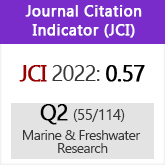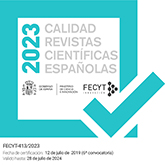Unnatural Oceans
DOI:
https://doi.org/10.3989/scimar.2001.65s2273Keywords:
overfishing, food webs, biological habitat, body size, historical ecologyAbstract
Ecological understanding of the oceans is based on an unnatural mix of mostly small species whose trophic relations are distorted to an unknown degree by the overfishing of megafauna including sharks, sea turtles, sea cows, seals, and whales. Living habitats like seagrass beds, kelp forests, and coral reefs that once provided critical 3-dimensional habitats for refuge and reproduction of most of the biodiversity of the oceans are also greatly reduced by fishing and other factors. Successful restoration and conservation require a more realistic understanding of the ecology of pristine marine ecosystems that can only be obtained by a combination of retrospective analyses, modeling, and intensive studies of succession in very large marine reserves.
Downloads
Download data is not yet available.
Downloads
Published
2001-12-30
How to Cite
1.
Jackson JB, Sala E. Unnatural Oceans. Sci. mar. [Internet]. 2001Dec.30 [cited 2024Apr.17];65(S2):273-81. Available from: https://scientiamarina.revistas.csic.es/index.php/scientiamarina/article/view/700
Issue
Section
Articles
License
Copyright (c) 2001 Consejo Superior de Investigaciones Científicas (CSIC)

This work is licensed under a Creative Commons Attribution 4.0 International License.
© CSIC. Manuscripts published in both the printed and online versions of this Journal are the property of Consejo Superior de Investigaciones Científicas, and quoting this source is a requirement for any partial or full reproduction.All contents of this electronic edition, except where otherwise noted, are distributed under a “Creative Commons Attribution 4.0 International” (CC BY 4.0) License. You may read here the basic information and the legal text of the license. The indication of the CC BY 4.0 License must be expressly stated in this way when necessary.
Self-archiving in repositories, personal webpages or similar, of any version other than the published by the Editor, is not allowed.
















